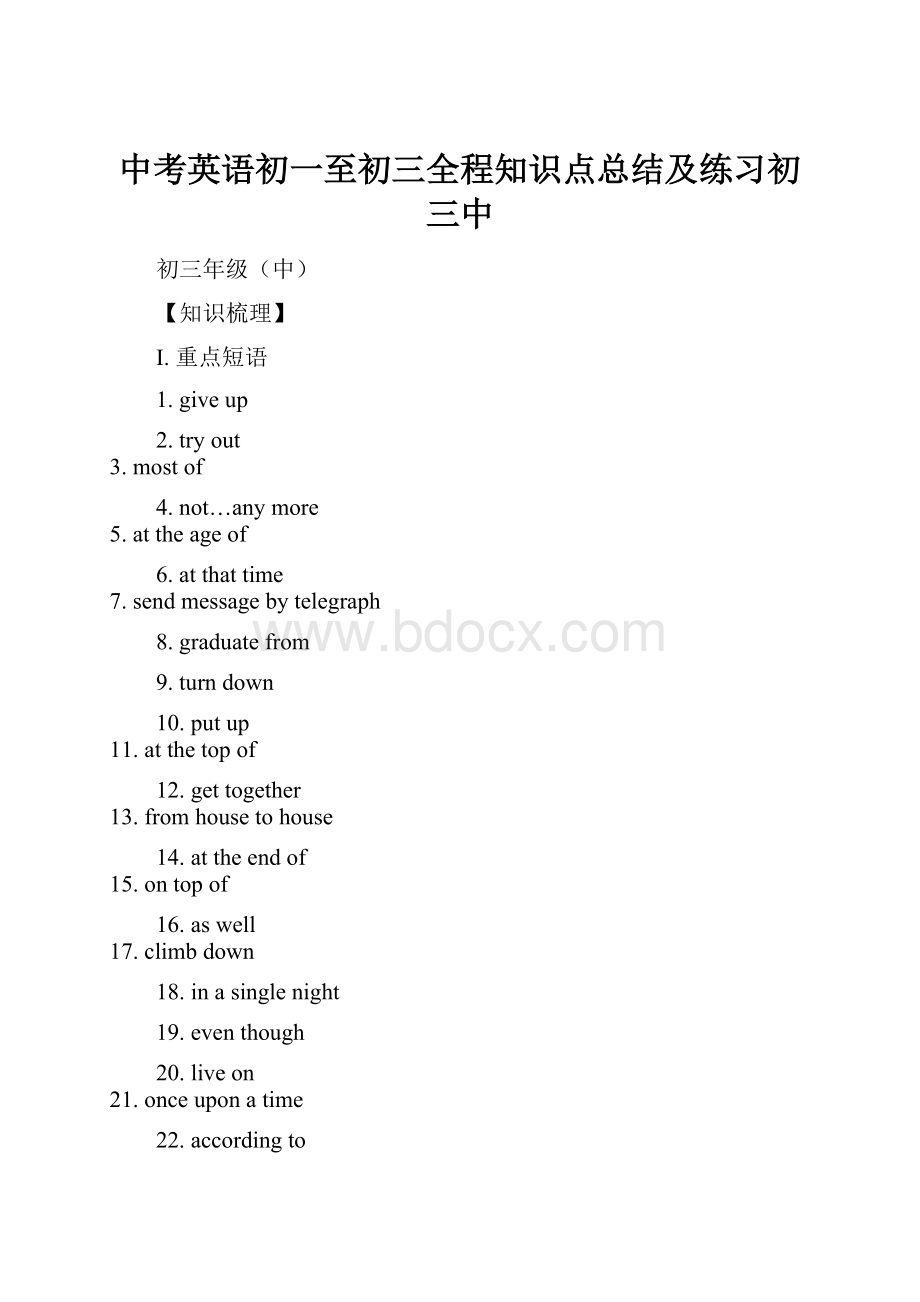中考英语初一至初三全程知识点总结及练习初三中.docx
《中考英语初一至初三全程知识点总结及练习初三中.docx》由会员分享,可在线阅读,更多相关《中考英语初一至初三全程知识点总结及练习初三中.docx(18页珍藏版)》请在冰豆网上搜索。

中考英语初一至初三全程知识点总结及练习初三中
初三年级(中)
【知识梳理】
I.重点短语
1.giveup
2.tryout
3.mostof
4.not…anymore
5.attheageof
6.atthattime
7.sendmessagebytelegraph
8.graduatefrom
9.turndown
10.putup
11.atthetopof
12.gettogether
13.fromhousetohouse
14.attheendof
15.ontopof
16.aswell
17.climbdown
18.inasinglenight
19.eventhough
20.liveon
21.onceuponatime
22.accordingto
23.keepwarm
24.ontheotherhand
25.onshow
26.ondisplay
27.inthefuture
28.lookup
29.TreePlantingDay
30.justright
31.asoftenaspossible
32.washaway
33.inthisway
34.inafewyears'time
35.pointto
36.thanksto
37.moreorless
38.sofar
39.shutdown
40.sendup
41.putoff
II.重要句型
1.setone'smindtodosth.
2.put…together
3.stop…from…
4.keep…from…
5.befilledwithsth.
6.givebirthto
7.becoveredwith
8.bemadeof
9.fill…with…
10.match…with
11.beusedfor
12.havenothingtodowith
13.comeupwith
14.nomatterhow…
15.keepsb./sth.warm
III.交际用语
1.---I'mtryingto…
2.---I'll…
3.---Whichofthesewouldyoulikemostto…?
4.---Whatdoyouwantto…?
5.---Iwantto…
6.---Ihopeto…
7.---Iplanto…
8.---I'mgoingto…
9.---I'msohappythat…
10.---I'mglad….
11.---metoo.
12.---What'sthiscalledinEnglish?
13.---What'sitmadeof?
14.---It'smadeof…
15.---What'situsedfor?
16.---It'susedfor…
17.---Englishiswidelyusedforbusiness/…
18.---Itisoneoftheworld'smostimportantlanguagesasitissowidelyused.
19.---Whereis/are…grown/produced/made?
20.---The(ground)mustbejustright…
21.---It'sbestto…
22.---Theholeshouldnotbetoodeep.
23.---TheGreatGreenWallis7000kilometreslong,andbetween400and1700kilometreswide.
24.---Themore,thebetter.
25.---Moreorless!
26.---The(ground)mustbejustright…
27.---Theholeshouldnotbetoodeep.
28.掌握以下常见标志:
ENTRANCEEXITPUSHPULLNOSMOKINGNOPARKING
FRAGILETHISSIDEUPNOPHOTOSDANGERBUSINESSHOURS
PLAYSTOPPAUSEONOFF
IV.重要语法
1.动词被动语态的结构和用法;
2.动词不定式的功能和用法。
【名师讲解】
1.beableto/can
(1)都能表示“能够,具备干某件事的能力”这个含义,此时可以互换。
Mr.Greenisabletofinishtheworkontime.
=Mr.Greencanfinishtheworkontime.
格林先生能够按时完成这项工作。
(2)beableto可以用于各种时态,而can为情态动词,多用于现在时,其过去式为could。
Wearesurehewillbeabletobeanartistwhenhegrowsup.
我们相信他长大后能够成为一名画家。
MissLinhasbeenabletopaythecarbyherself.
林小姐已经能够自己负担那辆车了。
(1)Can除了表示“能够,有能力做某事”以外,还有如下用法,而beableto则没有。
表示请求,但语
气没有could委婉
CanIhavealookatthispicture?
我能看看这张图片吗?
Canweleaveschoolafter6:
00p.m.?
我们可以在下午6点之后再离开学校吗?
表示可能性。
Thatmancan’tbeournewteacher.那人不可能是我们的新老师。
Theexamcan’tbetoodifficult.考试不会太难。
2.bring/take/carry/fetch
(1)bring一般是指拿来,即从别处往说话人这里拿,翻译成“带来”。
Hebroughtussomegoodnews.他给我们带来了一些好消息。
Pleasedon’tforgettobringyourhomeworktomorrow.
明天请别忘了把家庭作业带来。
(2)take一般是指从说话人这里往别处拿,翻译成“带走”。
Pleasetaketheumbrellawithyou.It’sgoingtorain.要下雨了,请把伞带上。
Shetookthedictionaryaway.她把字典拿走了。
(3)carry不强调方向,表示“携带、背着、运送、搬扛”等意思。
Theycarriedtheboxesintothefactory.他们把箱子搬进了工厂。
Ataxicarriedthemtothestation.出租车送他们到了车站
(4)fetch表示的是“去取来、去拿来、去叫来”等意思,包含去和来两趟。
Thewaiterfetchedthemsomeapples.侍者为他们取来了一些苹果。
Motherfetchedthedoctorforherillson.妈妈为生病的儿子请来了医生。
3.whole/all
(1)whole强调一个完整如一,互不分割的整体。
Thewholecountryissufferingthewar.整个国家正遭遇战争。
Ijustwanttoknowthewholestory.我仅仅只想知道完整的故事。
whole在句中的位置是放在所有格,冠词和指示代词的之后。
TheywillspendtheirwholeholidayinCanada.
他们将到加拿大渡过整个假期。
(所有格后)
Shehasfinishedwritingthewholebook. 她已经写完了整本书。
(冠词后
whole用来修饰可数名词(名词用单数)。
Heatethewholecake.他把整个蛋糕都吃了。
(强调整整一个蛋糕)
(2)all强调由一个个部分组成的“全部”。
MissGreenknewallthestudentsintheclass.
格林小姐认识这个班上的所有人。
(一个一个全认识)
all在句中的位置是放在所有格,定冠词和指示代词的之前。
Jimfinishedallhishomeworkintwentyminutes.
吉姆在20分钟之内完成了所有的作业。
(所有格前)
Ofalltheboyshere,hesingsbest.在这里所有的男孩之中,他唱的最好。
(定冠词前)
Theboycananswerallthesequestions.那个男孩能够回答所有的这些问题。
(指示代词前)
all既能修饰可数名词(名词须用复数),又能修饰不可数名词。
Allthesefivebooksaremine.这五本书都是我的。
(修饰可数名词)
Shewasworriedabouthersonallthetime.她总在为她的儿子担心。
(修饰不可数名词)
4.fill/full
(1)fill常作动词,与with连用,意思是“注满、装满”,也能表示“填空;补缺”的意思。
Hefilledtheboxwithchalk.他把粉笔装满了盒子。
Thebucketisfilledwithwater.水桶里装满了水。
(2)full是形容词,翻译成“满的,装满的”,常与of连用。
此外还能表示“完全的”和“吃饱的,过饱的”。
Alltheroomsarefullofpeople.所有的房间都满人了。
Thebuswasfull.Hehadtowaitforthenextone.这辆车人满了,他只有等下一辆。
5.bemadeof/bemadefrom/bemadein/bemadeinto
(1)bemadeof表示"由…制成",一般指能够看出原材料,或发生的是物理变化。
Thistableclothismadeofpaper.这张桌布是由纸做的。
Thissaladismadeofapplesandstrawberries.这种沙拉是由苹果和草莓做的。
(2)bemadefrom也表示"由…制成",但一般指看不出原材料,或发生的是化学变化。
Breadismadefromcorn.面包是小麦做的。
Thelifeboatismadefromsomespecialmaterial.这个救生艇是由某种特殊材料制成的。
(3)bemadein指的是产地,意思为"于…制造"。
ThecapsaremadeinRussia.这些帽子产于俄罗斯。
MymotherlikestobuythingswhicharemadeinChina.
我妈妈喜欢买中国产的东西。
(4)bemadeinto的意思为"被制成为…"。
Thispieceofwoodwillbemadeintoasmallbench.这块木头将要被制成一个小凳。
Thepaperhasbeenmadeintoclothesforthedoll.纸被做成了洋娃娃的衣服。
6.none/noone/neither
(1)none既能指人,又能指物,意思是"没有一个,无一",常用作代词,与of连用。
Noneofushasheardofhimbefore.我们没有一个人以前听说过他。
Ilikenoneofthecoats.那些外套我一件都不喜欢。
none用作主语时,谓语动词用单复数皆可。
Noneoftheanswersistrue.没有一个答案是正确的。
Noneoftheroomsaremine.没有一间房子是我的。
(2)noone只能用来指人,且不能与of连用。
Nooneisabsent.没有人缺席。
Iknewnoonethere.那里我一个人也不认识。
noone用作主语时,谓语动词只能用单数。
Nooneagreeswithyou.没有人同意你的说法。
(3)neither作代词是对两者都进行否定,意思为"两者都不",作主语时谓语动词用单数。
NeitheroftheboysisfromEngland.这两个男孩都不是来自英国。
Iknowneitherofthem.他们两个我都不认识。
7.found/find
(1)find的意思是"找到、发现",其过去式和过去分词都是found.
Ican'tfindmyglasses.我找不着我的眼镜了。
Hefounditboringtositherealone.他发现独自坐在这里很没劲。
(2)found是另外一个词,与find并没有关系,意思是"成立、建设",常用作及物动词。
ThePeople'sRepublicofChinawasfoundedin1949.中华人民共和国成立于1949年。
Theschoolwasfoundedbythelocalresidents.这所学校是由当地居民修建的。
8.hear/hearof/hearfrom
(1)hear的意思是"听见;听说,得知",后面能接名词、代词或宾语从句。
Weheardthenewsjustamomentago.我刚听说这个消息。
Canyouhearme?
能听见我说话吗?
(2)hearof的意思是"听说",一般指非直接的听见,而是听别人说的。
后不能接宾语从句。
Ihaveneverheardofher.我从未听说过她。
Theyheardofthefilmlongtimeago.他们很久以前就听说过这部电影。
(3)hearfrom的意思是"收到来信",与"听"无关。
Ioftenhearfromhim.我经常收到他的来信。
Hehasn'theardfromhismotherforalongtime.他很久没有收到妈妈的信了
9.send/sendfor
(1)send意思是"送往,派遣",还有"发信,寄信"的意思。
Thecompanysenthimtostudyabroad.公司派他到国外学习去了。
Mr.Brownsentherchildrenaway.布郎夫人送走了孩子们。
(2)sendfor意思是"召唤;派人去取;派人去拿",而非本人亲自去。
Theyhavesentforarepairman.他们已经派人去请了一名修理工。
Shesentforsomeflowers.她派了人去买花。
10.getto/arrive/reach
(1)arrive后不能直接接地点,是一个不及物动词。
若表示到达一个相对大的地点,用arrivein;若表示相对小的地点,用arriveat.
ThedelegationwillarriveinChinaat5:
00p.m.代表团将于下午5:
00到达北京。
Itwasdarkwhentheyarrivedattherailwaystation.当他们到达火车站的时候,天已经黑了。
Whendidshearriveherelasttime?
她上次是什么时候到这儿的?
(副词前省略介词)
(2)reach能直接接所到达的地点,是一个及物动词。
TheyreachedLondononFriday.他们星期五到达了伦敦。
Thenewsonlyreachedmeyesterday.我于昨天才接到这个消息。
reach还有"伸手去取,伸手触及,联络"等意思。
Canyoureachthatappleonthetree?
你能够到树上的哪个苹果吗?
Hecanalwaysbereachedonthephone.可随时打电话跟他联系。
(3)get在表示"到达"时是不及物动词,应与to搭配使用。
Weoftengettoschoolonfoot.我们经常步行到学校。
Theygottothetopofthehillatnoon.他们于中午到达了山顶。
【考点扫描】
中考考点在本单元主要集中在:
1.动词被动语态的结构和用法;
2.动词不定式的功能和用法;
3.本单元的词汇、短语和句型;
4.本单元学过的交际用语。
考试形式可以是单项填空、完型填空、短文填空和完成句子。
【中考范例】
1.(2004年北京市中考试题)
AuntLioftenasksherson________toomuchmeat.It’sbadforhishealth.
A.don’teatB.nottoeatC.noteatD.tonoteat
【解析】答案:
B。
该题考查的是动词不定式的构成和用法。
这个句子的基本句型是asksb.nottodosth.这里,nottoeat是不定式的否定式做宾语补足语。
2.(2004年嘉兴市中考试题)
Chinaisbecomingstrongerandstronger,soChinese________inmoreAmericanschoolsnow.
A.wastaughtB.istaughtC.teachesD.taught
【解析】答案:
B。
该题考查的是动词的语态和时态。
Chinese是一种语言,只能被人教,因此要用被动语态。
又因为说的现在的情况,动词要用一般现在时。
所以选B。
3.(2004年河北省中考试题)
Thispainting________toamuseuminNewYorkin1977.
A.sellsB.soldC.wassoldD.issold
【解析】答案:
C。
该题考查的是动词的语态和时态。
Thispainting只能被卖,所以用被动语态,又因为是1977年卖的,所以用一般过去时。
4.(2004年扬州市中考试题)
---Ifyou________anewidea,pleasecallmeassoonaspossible.
---Sure,Iwill.
A.keepupwithB.catchupwithC.feedupwithD.comeupwith
【解析】答案:
D。
该题考查的是短语动词用法。
本单元学习的短语动词comeupwithanewidea意思是想出新主意,正符合题意。
【满分演练】
一.选择填空。
1.Theboyistoohungry,hehasalreadyeatenanapple,butheasksfor_______one.
A.theotherB.otherC.anotherD.others
2.It’sgoingtorain.You’dbetter__________there.
A.don’tgoB.tonotgoC.nottogoD.notgo
3.Hespentmuchtime__________thework.
A.atB.inC.onD.for
4.MrGreenwouldliketomeettheheadmaster_______8:
00______9:
00tomorrow
morning.
A.from;toB.at;atC.between;andD.from;and
5.When_______hisuncle_________?
A.did;deadB.has;diedC.did;dieD.has;beendead
6.They________thiscitylastweek.
A.reachedtoB.gotC.arrivedDarrivedin
7.TheTVsetdoesn't______toomuch.Icanaffordit.
A.takeB.spendC.costD.pay
8.HisfatherwillbebackfromBeijing________amonth.
A.betweenB.afterC.inD.for
9.Hereadnothing,_________he?
A.doesB.doesn’tC.didD.didn’t
10.There’s_____milkinthebottle,isthere?
A.littleB.fewC.alittleD.afew
11.Look,thereisamapofChina______thetwowindows.
A.betweenB.amongC.aboutD.in
12.Twolanguagesarevery_____used.OneisEnglish,Chineseis______one.
A.wide,anotherB.widely,theothersC.wide,theotherD.widely,theother
13.Iwasbadlyillyesterday.That's______Ididn'tgotoschool.
A.whyB.becauseC.as